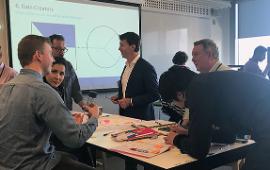Launch Camp takes off at Swinburne in university first

In Summary
- Swinburne first university to adopt CSIRO Launch Camp program
- Swinburne mentors help teams on path towards research-led innovation
Swinburne has expanded its partnership with CSIRO, becoming the first university to adopt its Launch Camp program.
Launch Camp, a part of the ON accelerator series, is designed to help researchers test and validate ideas in the early stages of translation or implementation.
Swinburne’s Innovation Precinct had 10 teams of academics, staff and PhD students complete the first phase of the program at the university’s Design Factory Melbourne last week.
Swinburne Pro Vice-Chancellor (Research Development, Innovation and Commercialisation) Professor Matthew Cuthbertson says Launch Camp is the first in a series of programs the Innovation Precinct plans to roll out.
“We already know there are extensive research and innovation capabilities across the university and these programs create a new platform for those capabilities to be channelled into the creation of new technology, products and services.
“Launch Camp provides a first step on the path towards research-led innovation and impact and we are committed to supporting teams through that process.”
Innovation Precinct director Professor Sally McArthur says the framework of the program was adapted to reach beyond science and engineering to include any type of innovation that connected back to Swinburne’s research capabilities.
Ideas included a social network analysis platform for professional sports clubs, an intergenerational robotics and coding program to address social isolation, and a sensor array capable of measuring the behaviour of single cells.
Each team was partnered with a mentor from within Swinburne and Professor McArthur says the development of the teams over the two days was exceptional.
“We asked each team to pitch their idea to us on early on the first day and then again at the end of the second day and the difference in focus and ability to describe their concept was incredible.
“The program is designed to challenge assumptions and to question ways of thinking. It requires team members and mentors to get out of their comfort zones, attempt to validate their assumptions and really connect with the problems their idea can solve. This approach obviously had a huge impact on the participants.
“We cannot wait to see how the teams progress.”
The teams will meet again in two weeks to continue the development of their unique value propositions and business canvases.
ON is funded via the Federal Government’s National Innovation and Science Agenda (NISA).

